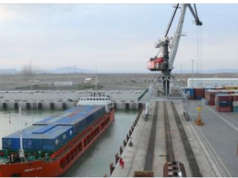Azerbaijani Journal of Economics and Social Studies has published an article by the Indian researcher Hriday Sarma and Strategic Analysis and Planning Manager at the Center for Analysis of Economic Reforms & Communications (IITKL) Vusala Jafarova.
Headlined “International North-South Transportation Corridor: Azerbaijan at Crossroads” the article says: “At present, the International North-South Transportation Corridor (INSTC) is greatly in academic discourse and international media limelight. This is for the fact on-the-ground activities relating to the corridor project, which connects Northern Europe with South-East Asia, are now moving forward in full swing. Azerbaijan, Iran, Russia and India are major participating states to this project. Azerbaijan due to its geo-strategic centrality in the supra-continent of Europe and Asia (Eurasia) and national economic competitiveness is emerging as a key nodal point along the INSTC. Its ‘Strategic Roadmap for Logistics & Trade Development’ is guiding the country’s transition from a traditional economy to an innovative, technology-rich and knowledge-based economy at the domestic front, and facilitating the establishment of passenger and goods connectivity with other countries at the international front.”
“However, at present private sector companies from the participating countries to the INSTC and other developed countries are not fully getting involved in the process of its actualization. This, in fact, is an essential requirement for developing sustainable global and regional value chains – which will become the arteries for the corridor project when it starts functioning. Therefore, at this point in time the international community, and particularly the international financial institutions, should actively invest in the project to attract more private participation and public-private partnerships. This will then lead to multifold increase in level of regional and global trade, which in-turn will ensure prosperity and peaceful co-existence of mankind across the Eurasia and worldwide,” the article says.






